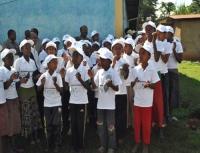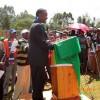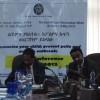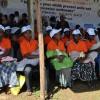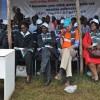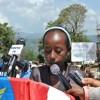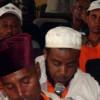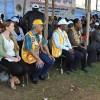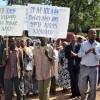Ethiopia Celebrates the Second African Vaccination Week
Addis Ababa, 30 April 2012 -- Ethiopia joined the rest of Africa to commemorate the second African Vaccination Week (AVW) on 30 April – 5 May 2012. Under the country theme, “Immunize your child; prevent polio and measles outbreaks”, the vaccination week aims to strengthen the immunization programme in the country by drawing attention to, and increasing awareness of the importance, the need and the right of all persons to be protected against vaccine preventable diseases.
The various events and activities conducted during the vaccination week in Ethiopia focused on increasing awareness of immunization and increasing access to vaccination services with emphasis on preventing polio and measles outbreaks.
The national launch of the 2nd AVW was held in Keffa Zone of the Southern Nations Nationalities Peoples Region (SNNPR) on 30 April 2012. Keffa zone recently experienced a large measles outbreak between October 2011 and February 2012 where over 3,000 measles cases were confirmed. Routine immunization coverage in the zone has declined from over 80% three years ago to 64% by the end of 2011, with thousands of unimmunized children registered.
The colorful launching ceremony in Keffa zone attracted hundreds of participants from the local, regional and national levels. The event was presided over by FMOH officials, SNNPR Regional and Zonal officials, WHO, UNICEF, Lions Club, CORE GROUP, CHAI, L-10 K, religious and traditional leaders, different sectors, mothers, children and stakeholders. Recognition was given to a local student in the 5th Grade for winning a poetry competition on the benefits of immunization. The poem was read to the gathering at the launching event.
Speaking on behalf of the Federal Ministry of Health, Ato Assefa Ayde, called on all stakeholders – decision makers, health workers, communities and partners, to play their role in ensuring all children are protected and outbreaks stopped. He noted the continued risk of polio importation and occurrence of measles outbreaks due to suboptimal immunization coverage at woreda level.
“The Health Extension Program has facilitated the expansion of service delivery closer to communities and additional opportunities exist through the scale up of the Health Development Army to sensitize communities and increase coverage for immunization and health services in general”, Ato Assefa remarked.
The SNNPR RHB Head, Ato Kare Chawicha, noted the Government efforts in the region to expand basic health services through construction of 365 health centers over the past 3 years with 144 more health centers currently under construction, equipping of 3,603 health posts and deployment of over 8,000 health extension workers in the region. On the commemoration of the AVW, the RHB Head noted, “This is a good opportunity for us to mop up and vaccinate any missed child so that a child should not be at risk of vaccine preventable diseases.
Therefore, from today onward, no child should be missed getting his vaccine which is his/her basic right and the quality of the cold chain system should also be maintained. Any missed opportunity should be counted on all of us.”. He further mentioned the region, in collaboration with partners, had recently installed a cold room in Bonga Town, Keffa Zone, that is currently serving Keffa, Benchi Maji and Sheka zones, which is seen as an opportunity to increase access to vaccination services through availing regular supply of vaccines.
In her remarks, the WHO Representative, Dr Fatoumata Nafo-Traoré, drew attention to the continued fight to eradicate polio globally. She noted that polio eradication has been declared a ‘programmatic emergency for global public health” and that 2012 is a critical year for the polio eradication initiative in the final push to end a disease that has crippled the lives of thousands globally. “We applaud the Federal Ministry of Health efforts to increase access to vaccination services in Ethiopia in order to ensure that all children and mothers are equitably reached with vaccination services.
The progressive improvement in vaccination coverage over the past few years to 86% coverage is commendable. A variation in performance at woreda level however, poses a risk of importation of wild polio virus and occurrence of outbreaks such as measles. Efforts to reach all un immunized children in the country should therefore be intensified. A high routine immunization coverage and vigilant surveillance system at sub national level is critical to sustain the gains achieved in polio eradication”, the WR remarked.
On behalf of the UNICEF Representative, James McQuenPatterson, appreciated the Government of Ethiopia in its efforts made in increasing immunization coverage, introducing new vaccines to reduce the incidence of measles and other vaccine preventable diseases nationally. UNICEF looks forward to working with the Government and partners to consolidating the achievements of the immunization program.
Lions Club Lauret, Hon Dr Tebebe Yemane Birhan, noted Lions Club ongoing efforts to make measles history. He highlighted the resource mobilization efforts of Lions Club International Foundation with the Bill and Melinda Gates Foundation to raise US$ 15 million to support measles elimination activities globally over the next three years.
Pledges of commitment to continue supporting the immunization programme were additionally made by CORE GROUP, CHAI and L10-K Representatives. The event also included vaccination of children by the main presiding guests from the Regional Health Bureau and partners; as well as traditional coffee and entertainment ceremonies.
A panel discussion was later in the day held at the Zonal level involving all Woreda Health Departments and stakeholders including religious leaders and local media, moderated by the Zonal Administration. The discussion reflected on the current trend in performance, obstacles and possible solutions to address the declining trend. Commitments were made from the stakeholders and administration to improve performance.
The Federal Ministry of Health utilized the AVW opportunity to formally remind all regions of the need to reduce the large numbers of unimmunized children in order to prevent outbreaks. Special attention was drawn to zones with large numbers of unimmunized children.
The second African Vaccination Week in Ethiopia which kicked off with media announcements through national radio stations across the country was coordinated by a national coordination committee established under the leadership of the Federal Ministry of Health (FMOH) to plan and coordinate all activities for the 2012 AVW, including resource mobilization. Partner agencies represented on the committee included WHO, UNICEF, Lions Club, CORE GROUP, ROTARY, Clinton Health Access Initiative (CHAI), L 10-K and IFHP.
The various events and other activities including the media contributed a lot in imparting messages on the importance of vaccination and a call to encourage all parents and communities to take their children to nearby health facilities for vaccination. The messages are expected to be broadcasted over one month. In addition, a television talk show will be broadcast during the week with panelists from the FMOH, WHO and UNICEF, to discuss immunization related topics.
A national press briefing was conducted on 27 April 2012 at the FMOH, presided by the Director of the FMOH Public Relations Directorate, Mr. Ahmed Emano, and in the presence of WHO and UNICEF Technical Officers. Several media agencies were represented at the press briefing and information was shared on the AVW and planned activities in Ethiopia.
Other activities conducted in Keffa zone in commemoration of the AVW included a micro planning workshop at zonal level held one week prior to the AVW involving all woredas to discuss performance and plan for improvement; local radio messages targeting caretakers and the communities at large; house to house registration of target children; and accelerated vaccination activities initiated during the AVW and to continue for one month in all woredas.
Ethiopia Celebrates the Second African Vaccination Week



